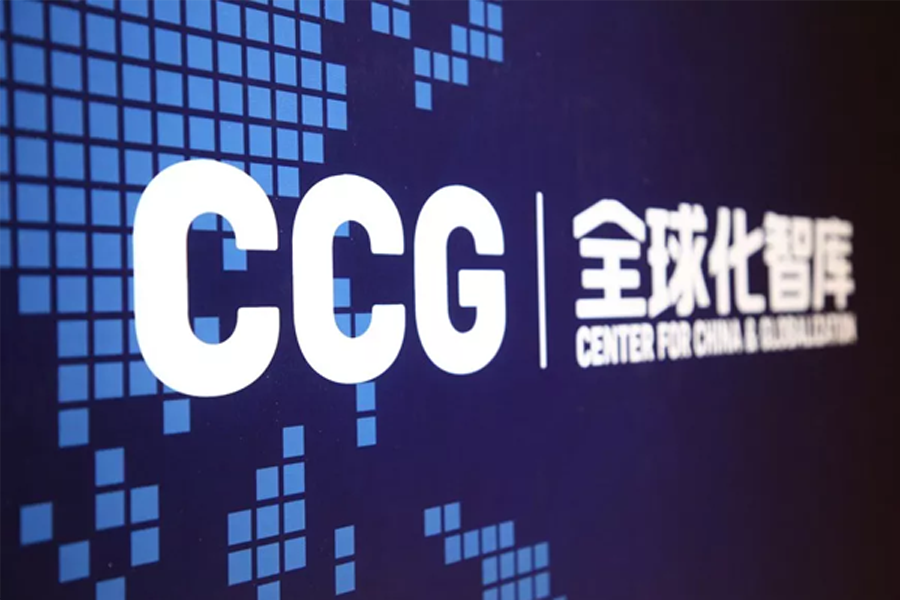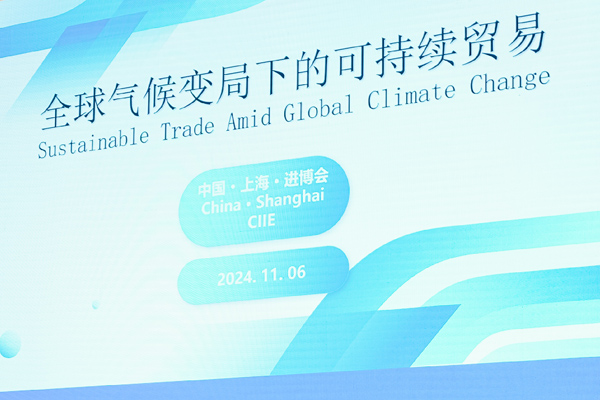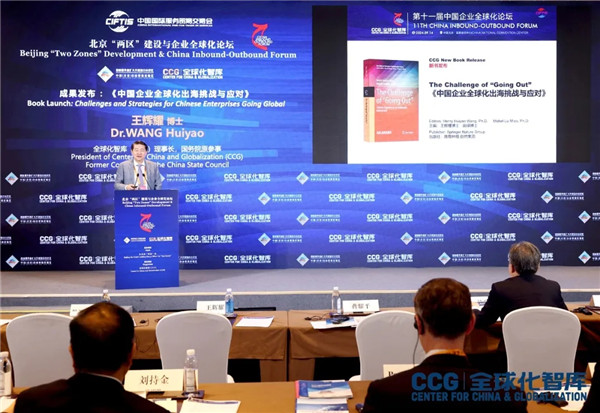Fifth China Outbound Forum provides fresh perspectives and recommendations for globalizing companies
January 20 , 2021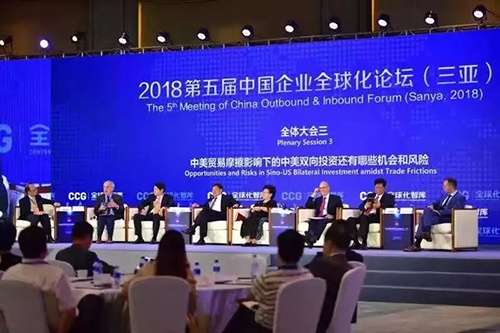
On November 17, the curtain came down marking the successful conclusion of the Fifth China Outbound Forum at the Mangrove Tree Resort Hotel in Sanya.
The two-day forum was jointly hosted by the Center for China and Globalization (CCG), China Association for International Economic Cooperation (CAFIEC) of the Ministry of Commerce, and the Sanya government.
This year’s forum featured 15 sub-forums covering a range of topics relating to economic globalization and the globalization of Chinese enterprises. More than 80 leading experts on outbound investment from China and abroad took part, hailing from business, government, and academia. The forum hosted over 300 distinguished guests from various sectors and was covered by numerous media outlets. The event provided a unique chance to celebrate the 40th year of Reform and Opening-up and look ahead to the coming years and decades of China’s development and globalization.
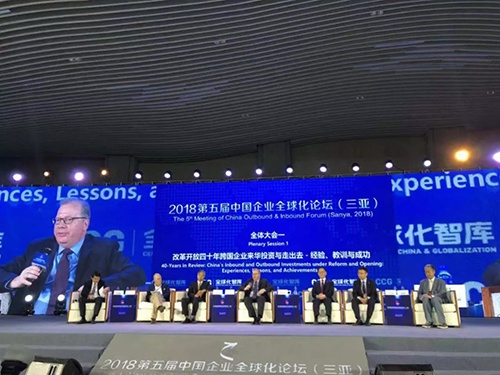
Over its five-year life, CCG’s China Outbound Forum has gained the support and recognition of government ministries, foreign politicians, well-known entrepreneurs, and international organizations. Speakers at this year’s event included CCG chairman and former vice minister of commerce Long Yongtu; Chen Jian, former vice minister of commerce and member of the 12th CPPCC National Committee; Zhu Guangyao, former vice minister of finance; Cui Mingmo, president of CAFIEC; Wang Huiyao, CCG president; and Nicholas Rosellini, UNDP Representative in China.
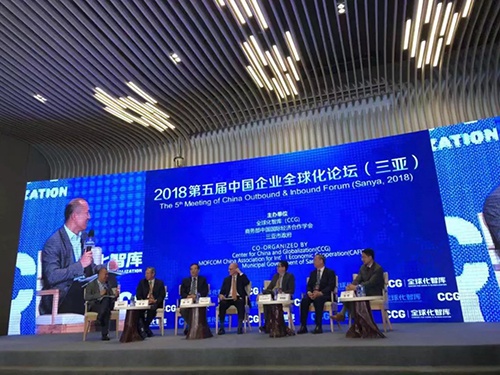
At present, the global economic situation is in flux and question marks hover over the future path of globalization. There are increasing international trade frictions and headwinds for the Chinese economy. In this context, how can foreign and Chinese foreign firms best navigate challenges and seek opportunities, while sharing the fruits of continued opening up and development? These are some of the key questions that the forum addressed.
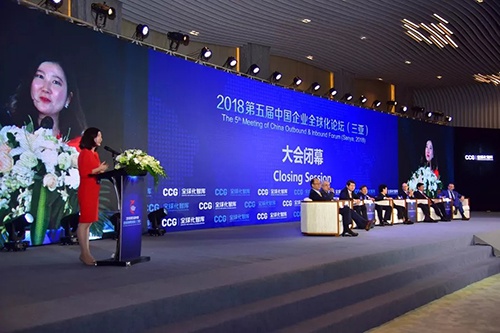
Closing session focused on reform and opening up and the global economy
The forum closing ceremony took place on the afternoon of November 17th. Speakers were CCG President Wang Huiyao; Chen Jian, former vice minister of commerce and member of the 12th CPPCC National Committee; Zhu Guangyao, former vice minister of finance; Cui Mingmo, president of CAFIEC. CCG Vice President Miao Lu presided over the closing session.
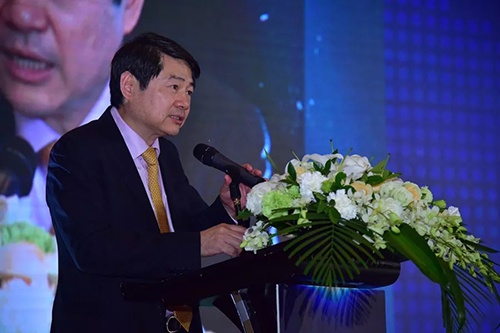
At the closing ceremony, CCG President Wang Huiyao expressed warm thanks to forum guests, organizers, and supporters from various fields
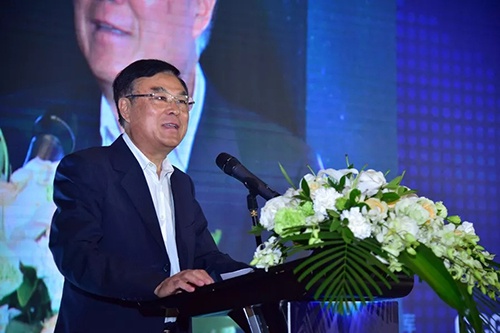
Cui Mingmo, president of CAFIEC, spoke on the importance of promoting the globalization of Chinese enterprises and international cooperation.
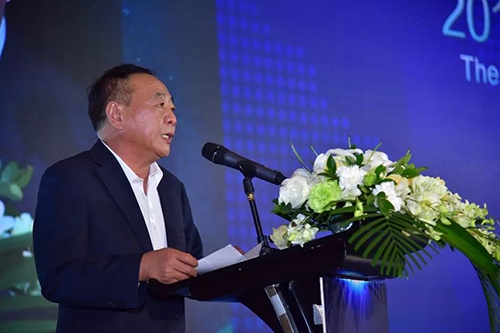
Chen Jian, former vice minister of commerce and member of the 12th CPPCC National Committee, recognized the role of the forum in promoting the globalization of Chinese enterprises.
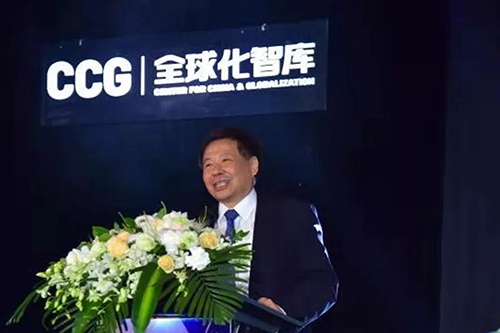
Zhu Guangyao, former vice minister of finance, noted the fruitful outcomes of the forum and hoped that it will continue to have a positive impact on reform and opening
Leaders from various field recognize and contribute to the globalization of Chinese firms
This year’s forum brought together experts from government, industry, and research institutes to discuss key issues related to the “going out” of Chinese enterprises.
This included in-depth, forward-looking discussion of outbound investment, analysis of successful case studies, and recommendations to assist firms to internationalize. At the same time, the forum also reviewed the broader changes in the world situation over China’s 40 years of reform and opening up, tracing the history of Chinese enterprises going global, and looking ahead to future trajectories of globalization.
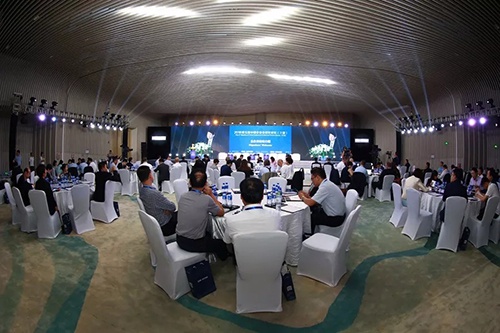
At the host introduction session on November 16th, CCG President Wang Huiyao and CAIFEC President Cui Mingmo welcomed participants and spoke on behalf of the organizers
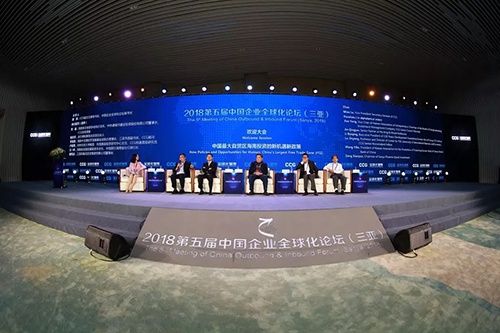
At the Welcome Session, business leaders and scholars exchanged views on new opportunities and policies for investment in Hainan Free Trade Zone, exploring which fields and sectors are expected to become investment hotspots under the new initiative.
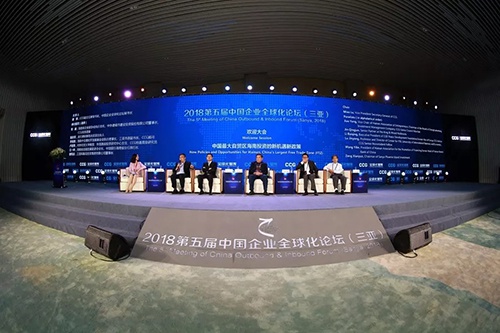
At the Welcome Session, business leaders and scholars exchanged views on new opportunities and policies for investment in Hainan Free Trade Zone, exploring which fields and sectors are expected to become investment hotspots under the new initiative.
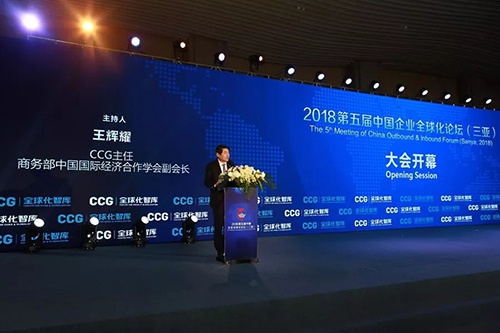
At the opening session, CCG President Wang Huiyao noted that this year’s forum coincides with the 40th anniversary of reform and opening up, the 30th anniversary of the creation of Hainan province, and the first year of the new Hainan Free Trade Zone. Wang expressed thanks to the Sanya municipal government and local community for their continued support.
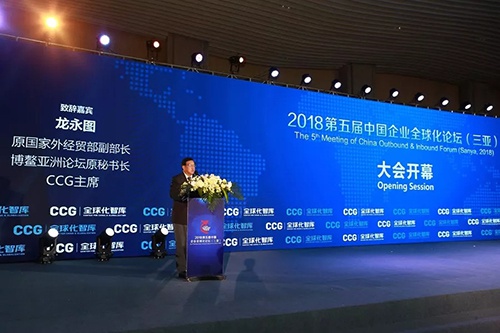
In his opening remarks, CCG Chairman Long Yongtu highlighted how anti-globalization tendencies have emerged in many parts of the world. In light of this challenge and growing protectionism, he stressed that deepening reform and opening up is the best choice for China.
Lauding the major achievements of Chinese companies “going global,” especially under the framework of the Belt and Road Initiative (BRI), the CCG chairman also noted the challenges that outbound investment has faced and stressed that there is room to improve China’s business environment to attract foreign investment. Recognizing the rise in anti-globalization sentiment, he maintained that China should respond by continuing to deepen reform and open up. Long also said that greater efforts are needed to deal with the new trends in globalization, starting with refining trade policies. While in the past, trade policy focused on exports, in the future, while continuing to promote exports, he said China must also seek ways to expand imports.
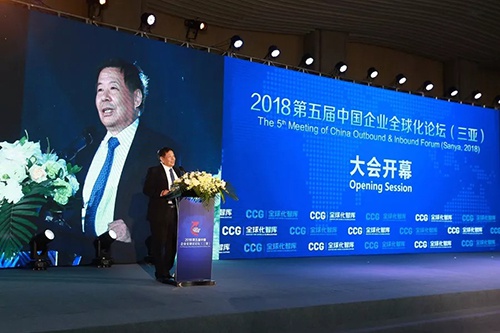
In his speech at the opening session, Zhu Guangyao, former vice minister of finance, stressed that in the trade war there would be no winners, only losers.
He said that developments in the global economy this year have woken people up to the dangers of unilateralism and trade protectionism. He described four side effects of the trade war on the wider economy: disruption of global supply chains and harming the interests of various countries and the process of economic globalization; negatively impacting the WTO-centered fair and transparent multilateral trading system; hampering cultural exchange and flow of talent between different countries; and the deleterious effect of unilateralism on the economic base and social order. In the long run, he said these consequences would harm the cause of world peace and development.
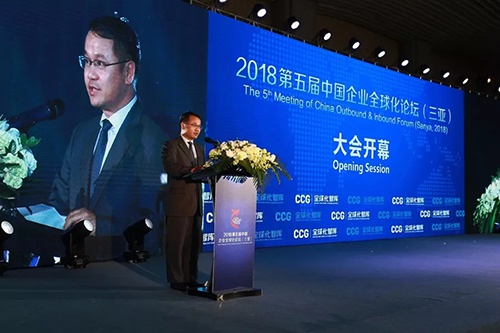
Xie Qinglin, deputy mayor of Sanya City, said that Sanya would continue to improve investment and trade facilitation in the future and strive to become a bridge between China and the world. He said that Hainan has made great progress in attracting investment since President Xi’s speech on April 13, which marked the 30th anniversary of the establishment of Hainan province. Highlights include conducting business and strategic cooperation negotiations with 88 Fortune 500 companies and China top 500 companies; securing 268 intentions to invest; and 45 plans to locate headquarters, sector or regional headquarters in Sanya, with 19 companies having already carried out related work.
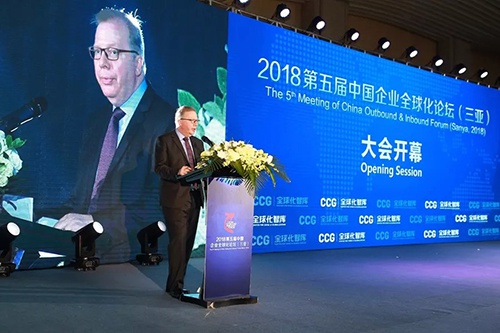
Nicholas Rosellini, UN Resident Coordinator & UNDP Resident Representative in China, outlined the many issues to be addressed in today’s global development, the most important of which are economic inequality and climate change. He called for increased efforts to be made to address these issues in China and abroad.
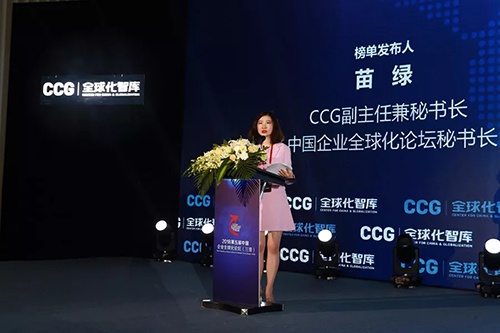
Release of the Blue Book on the Globalization of Chinese Enterprises
The evening dinner session marked the release of CCG’s Blue Book on the Globalization of Chinese Enterprises, as well the unveiling of lists such as the “2018 Top 50 Chinese Globalizing Firms”, “Top 50 Innovative Globalizing Firms” and “Top Ten Belt and Road Pioneers Firms” to recognize the achievements of Chinese firms “going global” over 2017 to 2018. Zhang Baoquan, board chairman of Antaeus Group and founder of the Mangrove brand, delivered a speech, expressing thanks to forum guests and CCG for its contributions in promoting the China Outbound Forum. Following this, enterprise representatives were presented with awards for their achievements.
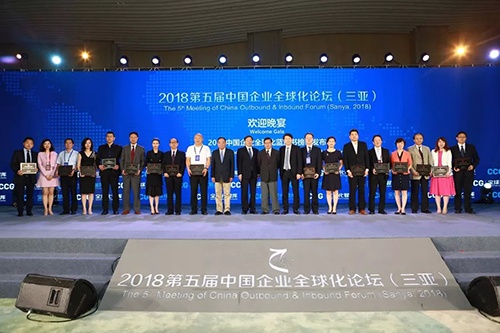
After the awards dinner, the opening panel was held on the theme of “Prospects for Higher-Level Opening Up.” Against a backdrop of challenging economic conditions, a series of policies have been introduced to support business. Participants discussed what can be done to boost confidence in the business community, shared views on issues facing companies at the present time, and talked about strategies to navigate current difficulties.
The session was chaired by CCG Chairman Long Yongtu and featured discussants Zhu Guangyao, former vice minister of finance; Chen Jian, former vice minister of commerce and member of the 12th CPPCC National Committee; Wang Huiyao, CCG president; Zhang Hongli, vice chairman of Hopu Investment and former deputy head of ICBC; and Zhang Huarong, vice chairman of CCG and chairman of the board of directors of Huajian Group.
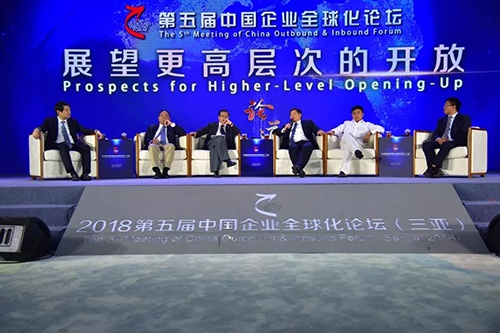
Exploring the globalization of Chinese enterprises
Over the two days, the forum featured a series of plenary sessions covering key topics. These sessions are outlined below.
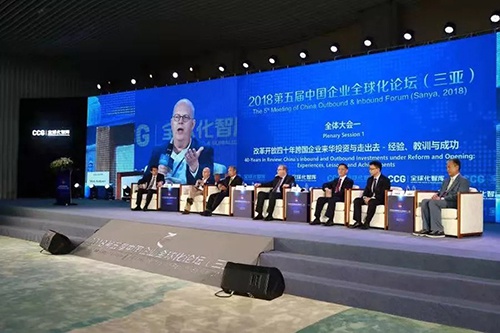
Plenary Session 1: China-bound investment and “going out” by multinationals over 40 Years of Reform and Opening: Experiences, lessons, and achievements
In the four decades of Reform and Opening-up, foreign-invested enterprises and private enterprises have made major contributions to China’s economic and social development. This session looked back over the past 40 years and also to the future, focusing on the experiences of Chinese and foreign companies to draw lessons and contribute insights to the continued process of “comprehensively deepening reform.”
Chaired by CCG President Wang Huiyao, discussants sharing their views and experiences were Nicholas Rosellini, UNDP Representative in China; Mats Harborn, president of the European Union Chamber of Commerce in China; He Ning, CCG senior fellow and former director-general of the Department of American and Oceanian Affairs, Ministry of Commerce; Li Jiping, executive vice president of CAPDF and former deputy head of China Development Bank; He Donghui, co-CEO of Fang Dong Group; and Liu Zhiping, VP of SK Group China.
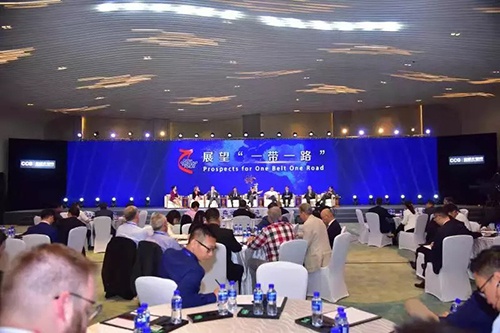
Plenary session 2: Five years of the Belt and Road and future prospects – Deepening cooperation between Chinese and foreign firms
It is now five years since the Belt and Road Initiative (BRI) was first proposed by President Xi Jinping in 2013. Drawing on experiences so far, this session explored the biggest opportunities and challenges for companies investing in BRI projects, necessary conditions for BRI projects to be successful, and what can be done to win support from more international partners for the BRI.
Discussants were CCG Chairman Long Yongtu; Chen Jian, former vice minister of commerce and member of the 12th CPPCC National Committee; Pierre Dorbes, head of delegation of the ICRC Regional Delegation of East Asia; Ambassador Stanley Loh, Singaporean ambassador to China; Li Xinhua, vice chairman of China National Building Materials; Alistair Michie, secretary general of the UK East Asia Committee; Alidad Mafinezam, president of the US West Asia Council; and Clare Pearson, chair of the British Chamber of Commerce. CGTN anchor Lin Xi chaired the discussion.
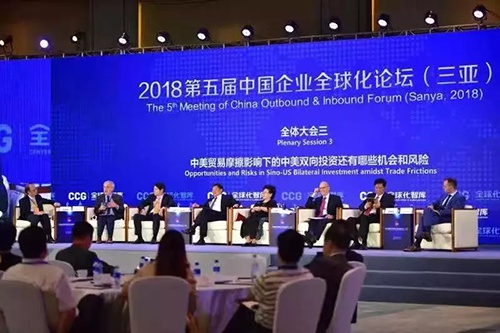
Plenary Session 3: Opportunities and risks in Sino-US bilateral investment amidst trade frictions
The third plenary session explored the implications of Sino-US trade frictions for the economy, trade, and investment in China and the wider global economy. There was also in-depth conversation over the future trajectory of Sino-US relations and prospects for business, including how to mitigate negative impacts, unlock opportunities and tap new markets.
Sharing their views were Zhu Guangyao, former vice minister of finance; Wang Huiyao, CCG president; Meng Xiaosu, chairman of China National Real Estate Development Group; William Zarit, chairman of AmCham China; Jacob Parker, vice president of the US-China Business Council; Chen Wenling, CCG academic advisor and chief economist of the China Center for International Economic Exchange; and David Zweig, Chair Professor of Social Science at the Hong Kong University of Science and Technology. The session was hosted by Qiu Zhenhai, current affairs commentator on Phoenix TV.
Parallel forums bring forth fresh views and recommendations for Chinese companies going global
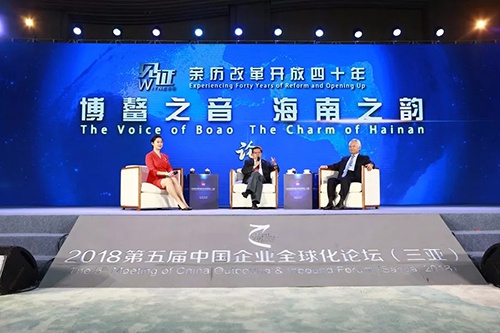
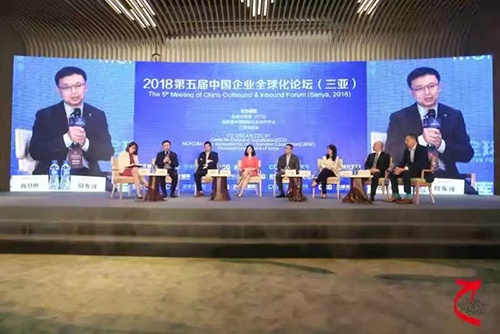
In addition to the plenary sessions, the China Outbound Forum featured six parallel sessions covering topics such as:
New strategies of multinational corporations amidst closer scrutiny of global capital flows
Experiencing 40 years of reform and opening – the Voice of Boao, the charm of Hainan
Technology companies “going out” and coming to China: Developing new market opportunities
Strategies for talent and branding to succeed in domestic and international markets
The role of Chinese and world manufacturing in global value chains: Boosting complementarity and industry upgrading
These discussions provided practical insights and fresh perspectives for Chinese and foreign companies pursuing internationalization.

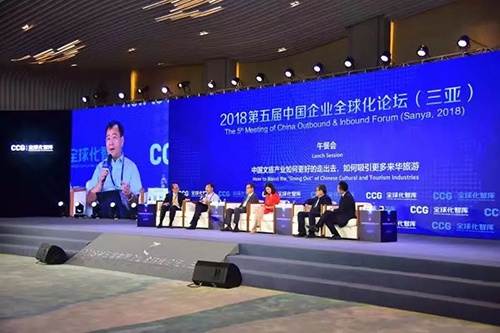
At a luncheon on the 17th, CCG invited leading experts to discuss how to boost the “going out” of Chinese cultural tourism industries and attract more tourists to China. This included talk of how to build brands in the internationalization process and the key issues for culture and tourism promotion amidst the context of urbanization and globalization.
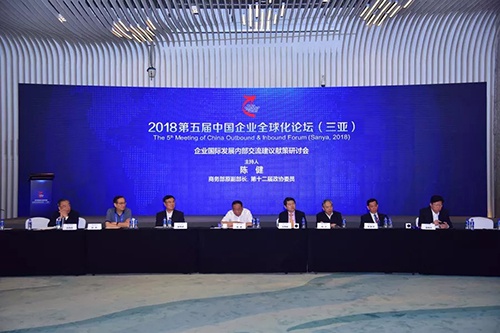
After the official closing of the forum, a closed-door seminar was to facilitate exchange and discussion of policy recommendations between officials, business leaders and scholars on the international development of enterprises.
About the Outbound Forum
Founded in 2014, the China Outbound Forum has been held annually for five consecutive years, achieving fruitful outcomes and gaining the support of government ministries, foreign politicians, well-known entrepreneurs, and international organizations.
The China Outbound Forum is a flagship event of the Center for China and Globalization, providing a platform for business leaders, policymakers and scholars to exchange views and experiences relating to the globalization of Chinese and foreign enterprises.

